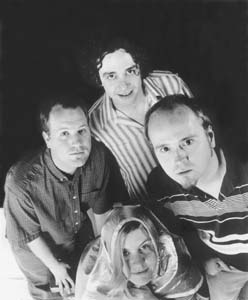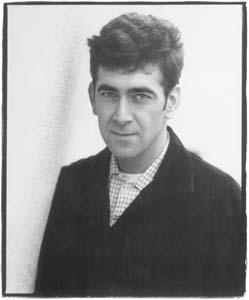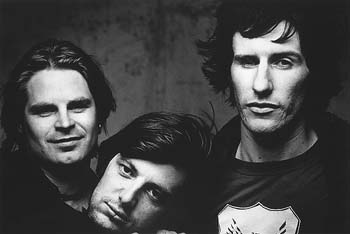Good Vibrations
Everyone loves the Beatles and the Beach Boys--so why can't bands make it playing the same kind of pretty pop?
By Gina Arnold
IT'S A FUNNY THING, but despite the fact that most people on this planet love the Beatles and the Beach Boys to distraction, emulating either band has long been an extremely uncommercial move in pop music. Strangely, it seems as if the repertoires of both bands have satiated the audience for that type of melodic music making.
Even though no more really need be said on the subject of three-chord rock beyond "Love Me Do" and "Twist and Shout," rock bands keep trying. Indeed, the world still abounds with Beatles-esque groups that have gone absolutely nowhere with their attempts to recreate the genre in a more modern image.
Big Star, the dB's and the Las are all notable for their beautiful jangle-pop melodies and sweet, lovelorn lyrics. So too are Teenage Fanclub, Red Kross and the Posies, none of which has scored hits in America (though they sure got good reviews).
Of course, all these bands arrived in the public's consciousness during the '80s, when radio was fixated on classic rock, heavy metal and New Wave: there was no room for pop music in between cuts by the Thompson Twins and Mötley Crüe. College radio was more forgiving, but pop was never its metier either.
Only now, after years of hearing the kind of atonal quirkiness typified by bands like Pavement and the Flaming Lips, has indie rock suddenly adopted tunefulness as its motto. Pop is finally trendy again, and every band out there wants to write another "Wonderwall."
But none of the bands hoping to emulate Oasis in purveying tuneful melodic pop has grasped the other half of the equation. The Beatles had a context: breaking free of convention, the end of postwar deprivation, Carnaby Street, the mods and so forth. These days, bands are having a hard time finding a similarly riveting subtext to make their music matter, and that goes for indie bands as well as the mainstream ones--and for Oasis itself.
Take, for example, the efforts of the Elephant Six collective, a Florida-based group of musicians who have banded together in order to facilitate their art. The collective's main acts are the Olivia Tremor Control, Neutral Milk Hotel and the Apples in Stereo. All three play experimental light pop with Beatles overtones, particularly from "I Am the Walrus" and "A Day in the Life." All the Elephant Six bands are lo-fi; to them, the medium is the message, and the medium is pop.
Keene was forced out of circulation because his music had nothing in common with the era. Bravely, his new album, Isolation Party, sounds identical to his pretty and poignant mid-'80s work. He plays jangle pop, pure and simple, full of heartachy lyrics about outgrowing your girlfriend or getting dumped. The words are surrounded by strummy-whirry backgrounds jammed with well-placed minor sevenths and open-chord tunings that can make listeners murmur with delight.
Unfortunately, Keene has almost as little hope of making it today as he did 12 years ago. Something about his music melts into thin air, despite the fact that songs like "Love Dies Down" and "Battle Lines" are at least as direct and as melodic as those of the Wallflowers and Hootie and the Blowfish.
EQUALLY HOPELESS are the commercial ambitions of the super pop act You Am I. In its native Australia, You Am I sells at platinum levels. Last year, it won for best record and best group at the Australian Music Awards, and its U.S. debut record, Hourly, Daily, debuted at No. 1 down under.
But despite touring with Soundgarden, appearing at Lollapalooza and being produced by Lee Ranaldo of Sonic Youth, the band has achieved less than no prominence in America, and what's more, it probably never will.
Indeed, Hourly, Daily is doomed to obscurity on our shores, containing as it does everything guaranteed to scare off the American public. The album's songs bear too much melody and too many words for most audiences here. They are tuneful, complicated, verbose and sonically eclectic.
If, however, you happen to be the kind of person who has a large and varied record collection, a penchant for '60s mod bands and a fondness for clever wordplay, You Am I will probably induce a steep upward mood swing. Songs like "Trike" and "Who Takes Who Home?" are full of poignancy and charm; "Mr. Milk," with its infectious "fa fa fa" chorus, is irresistible.
These bands' hearts and minds are ruled by the Left Banke, Big Star, the Kinks and the Beatles. There is another school of indie rockers that takes its inspiration from a single album by the Beach Boys. The Apples in Stereo, the Liquor Giants and the High Llamas are critically acclaimed bands with outright Beach Boys fixations: the Apples even named their home studio "Pet Sounds" in case a listen to their LP Tone Soul Revolution hadn't already alerted a listener to their personal obsession.
The new record by L.A.'s Liquor Giants--led by former Pontiac Brother Ward Dotson--is also drenched in the sensibility of the Beach Boys, as is Hawaii by the High Llamas. Indeed, the Llamas--an offshoot of the now-defunct Irish band Microdisney--simply recreate Pet Sounds, only without the queer poignancy that Brian Wilson's lyrics to "Wouldn't It Be Nice" and "I Just Wasn't Made for These Times" imparted to that blissfully hymnlike music.
ALL THIS PRETTY POP falls easily on the ears and offers a pleasant change from the loud guitars, atonality, electronica urges and irony that have typified the last few years of underground rock. And yet there's something mushy and unsatisfying about it all too. It is as if, instead of taking John Lennon for their mentor, the new pop bands took Paul McCartney, circa 1996. What is that these people are trying to say?
It's a question well worth asking, because today's underground scene is inevitably tomorrow's mainstream--and judging by this outpouring of pop albums, radio at the turn of the millennium is going to deliver an endless stream of sugar--edgeless music adrift in a sea of melody.
Of course, rock & roll is a cyclical thing. Stylewise, it goes back and forth from glamorous to grunge, while musically, hard rock and metal surfaces, bombs and resurfaces every 10 years or so, depending on the economic situation of the lower middle class.
But I still worry about the return of pop. Its lack of inspiration puzzles me. Perhaps the new-pop movement heralds the end of rock, by plopping it back into the prerock era of love songs and lounge tunes of the type sung by Bing Crosby, Frank Sinatra and Connie Francis.
Or perhaps not. True, it's impossible to picture one of these soft-rock songs having the same effect on pop culture as "The Ballad of the Thin Man" by Bob Dylan or "Smells Like Teen Spirit" by Nirvana. But sometimes, sheer melodious pop--comfort food for the ears--is just what the doctor ordered.
[ San Jose | Metroactive Central | Archives ]
Copyright © Metro Publishing Inc. Maintained by Boulevards New Media.
![]()
 Fruit From the Apple Tree: Pop music begins and ends with the Beatles for Apples in Stereo.
Fruit From the Apple Tree: Pop music begins and ends with the Beatles for Apples in Stereo. Then there is Tommy Keene, who has, in the course of 10 years, managed to be simultaneously the most commercially promising and the most invisible man on the block. Winner of the Village Voice's Jazz & Pop poll in 1984 for his EP Places That Are Gone, Keene signed with Geffen Records a year later and immediately disappeared from view.
Then there is Tommy Keene, who has, in the course of 10 years, managed to be simultaneously the most commercially promising and the most invisible man on the block. Winner of the Village Voice's Jazz & Pop poll in 1984 for his EP Places That Are Gone, Keene signed with Geffen Records a year later and immediately disappeared from view.

From the March 26-April 1, 1998 issue of Metro.
![[Metroactive Music]](/music/gifs/music468.gif)